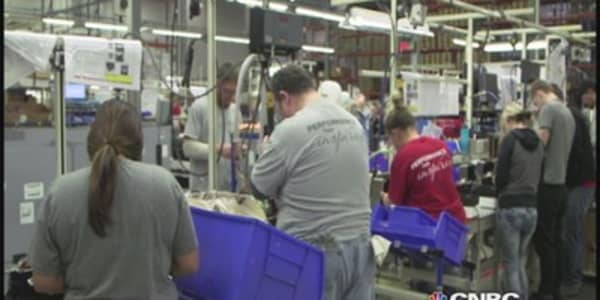
It's a vital part of the German economy and a key reason for its corporate success story. But outside Germany, the term "Mittelstand" – private, family-run companies - is a mystery.
But check out the figures: over 99 percent of all German companies are part of the 'Mittelstand', contributing nearly 52 percent of the country's economic output and employing more than 15 million people.
Here, CNBC.com takes a look at the German Mittelstand, and finds out what makes it so special and successful – and what the rest of the world can learn.
Read MoreRelative values: Companies keeping it in the family
What does the term Mittelstand mean?
It's a broad definition, but businesses usually described as Mittelstand are generally private, family run companies that specialize in one product or service.
They may do only one thing, but these businesses do it very, very well. Though based in Germany, many place a strong focus on exports and will have offices and subsidiaries across the globe.
"They are less driven by capital markets, therefore their short-termism – which we often see in the Anglo-Saxon world – is less pronounced, because they invest in the longer term," Ulrich Hoppe, Director General of the German-British Chamber of Industry & Commerce, told CNBC.
Many Mittelstand companies also have deep ties with their local communities.
"There's… this unique bond between employer and the employees… they know their employer will stick to them, and therefore they can develop new ideas, innovations, inventions," Hoppe said.
What are the core strengths of the Mittelstand business model?
A key strength of the Mittelstand is the strong family ties many of them have. "The successful characteristics of Mittelstand companies – or micro-multinationals as they can be called – are family ownership or independent ownership," Will Stirling, from Meet The Mittelstand, told CNBC.
This ownership structure, according to Stirling, enables companies to make decisions quickly when it comes to investment and devote a higher proportion of turnover on research and development.
Read MoreWill labor reforms sink Italy's family firms?
Again, a deep bond with the local community is an integral part of the Mittelstand model's success. If a large proportion of a town works for one company that offers them excellent vocational training straight out of school, good working benefits, and a steady job – sometimes for life – a strong sense of loyalty is forged.
"If you show that person that you want to invest in them, they'll give the best back to you," Stirling added.
Sounds impressive, but there must be some challenges, right?
While a business model based on "keeping it in the family" may provide stability and loyalty, issues do still arise. "Not everybody is just as bright as his Dad was or as successful, and also you can't have 10 children if you have a board of 10," Bob Bischof, Chairman of the German British Forum, told CNBC.
To tackle this kind of problem, it might be necessary for outsiders to be brought in. "Sometimes families are excellent at managing a business over generations, sometimes some generations are stronger or weaker than others," Stephen Roper, Professor of Enterprise and Director of the Enterprise Research Center at the Warwick Business School, told CNBC.
Read MoreWhy the US can take on Germany at its own game
"Bringing in professional management can strengthen the capabilities of family businesses, and help them to sustain future growth," Roper added.
Can other countries learn from Germany?
The Mittelstand model has brought stability to the German workforce and economic strength to the economy, and it's this dependability and reliability that can be replicated elsewhere, experts say.
"It is worthwhile to be there in the long run and not just to [be a] serial entrepreneur, but to have a commitment towards a product, towards a service and also towards your own employees, which you actually need to develop new ideas: inventions, innovations and so on," Hoppe told CNBC.
For Roper, focusing on the needs of the consumer – rather than innovation for innovation's sake – is a key lesson to be taken. "German Mittelstand companies remain close to their customers, they focus on innovation, but they focus on innovation which is very customer relevant, which delivers value to their customers."




